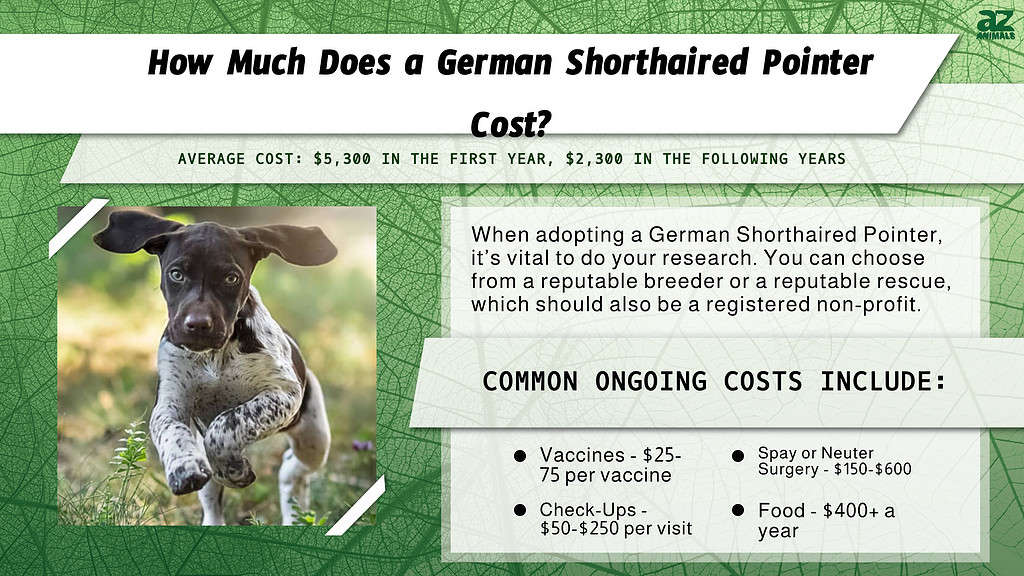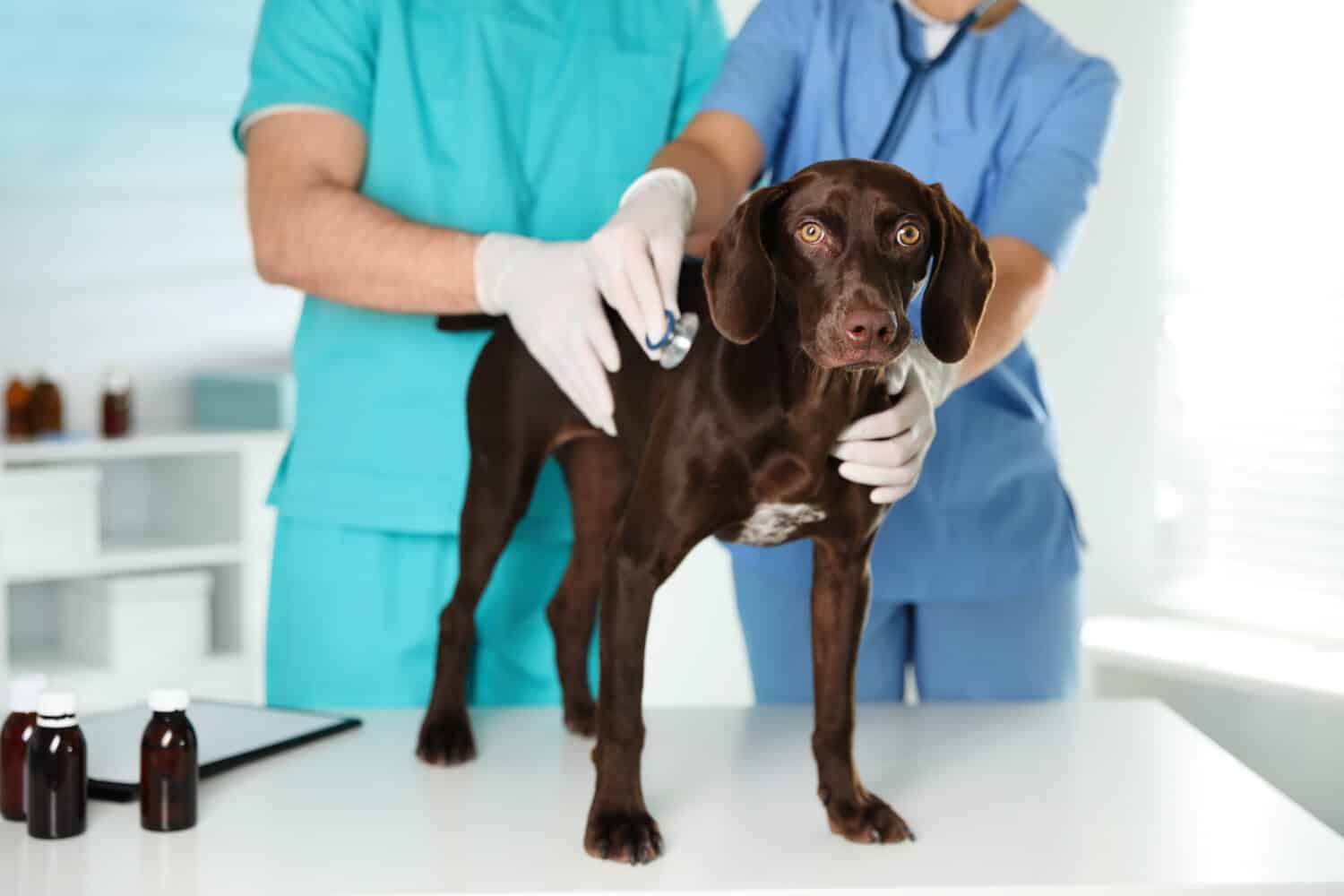The German Shorthaired Pointer, or GSP, can range drastically in price depending on your budget and the cost of living in your area. It’s easy to splurge on your pup and spend much more than the average dog guardian and also to scale back and stick to a lower budget if needed.
Most people will pay around $5,300 for their German Shorthaired Pointer in the first year, and $2,300 in the following years. This includes pet insurance, routine veterinary care, kibble, and more.
In this article, we’ll break down every cost for your GSP to help you decide what to budget for, and also add up the total amount you can expect to spend on your dog throughout their lifetime.
How Much Does a German Shorthaired Pointer Puppy Cost?

German Shorthaired Pointers from breeders are more expensive than from rescues.
©iStock.com/BeeBuddy
German Shorthaired Pointer puppies from reputable breeders can cost anywhere from $800-$3,000 or more. Rescue GSPs will cost $500 or less.
When adopting a German Shorthaired Pointer, it’s vital to do your research. Reputable breeders will:
- Have up-to-date OFA health testing for both parents and will never breed dogs with genetic health conditions.
- Go out of their way to keep their dogs out of shelters. They should stipulate in your contract that the dog goes back to them if you need to rehome them, and should also keep their name on the microchip.
- Find homes for puppies before they’re born, and care where their dogs end up. There will likely be a waitlist, and you shouldn’t be able to take a puppy home immediately.
- Will let you see where the dogs are raised, and won’t meet in a secondary location such as a parking lot to adopt out dogs.
- Breed infrequently and are knowledgeable about their breed. Having many litters available at once is a red flag that likely means you’re dealing with a puppy mill.
- Provide references including their veterinarian and past puppy adopters.
- Answer your questions honestly, and ask questions in return to ensure you’re a good fit for the puppy.
Reputable rescues should be registered non-profits. “Rescues” with many litters of young puppies can be puppy mills in disguise, so it’s important to do your research and ask questions!

Other Factors That Influence the Purchase Price of a German Shorthaired Pointer
Your GSP puppy may vary in price depending on their lineage, the time put in by the breeder, and the cost of living in the breeder’s area.
When a breeder has champion show dogs, they’re likely to charge more for the puppies. They might cost up to $5,000 or even more.
All breeders should put time and effort into socializing and early training, but those who go above and beyond or keep the puppies longer than usual might charge more for their time.
Lastly, you’re more likely to find a cheap GSP puppy out in the country, where there’s a lower cost of living, than in a big city. This helps the breeder be able to pay for their dogs.
Cost of Vaccination and Other Medical Expenses for German Shorthaired Pointer

It’s important to plan ahead for veterinary care by having either savings or pet insurance.
©New Africa/Shutterstock.com
Vaccines – $25-75 per vaccine
First-year vaccinations for your German Shorthaired Pointer can be expensive, especially if you’re planning on bringing your dog into public often or engaging with other dogs. This is because many vaccine recommendations depend on your dog’s lifestyle.
Getting only the core vaccines (rabies and DHLPP) will cost $125-$375 during year one and $50-$300 every three years after, depending on the cost and how frequently your vet recommends the DHLPP vaccine. It can be given yearly or once every three years.
To get every vaccine for your dog will cost 475-$1575, again depending on vaccine costs and their recommended frequency. The following years would cost anywhere from $166-$700.
Luckily, most dogs don’t need every single vaccine. Have an open conversation with your veterinarian about your lifestyle, risks in your area, and what they recommend for your dog.
German Shorthaired Pointer Vaccine Schedule
Below is a list of vaccines and when they should be given, to allow you to budget for what’s important to you.
| Vaccine | Initial Timeframe | Boosters | Core Vaccine? |
|---|---|---|---|
| Rabies | 12-16 weeks old | One year after initial vaccination, then once every three years | Yes |
| DHLPP (distemper, hepatitis, leptospirosis, parainfluenza, and parvo) | Six weeks old | Eight weeks, 12 weeks, and 16 weeks old Another booster one year later, then once every one to three years | Yes |
| Bordetella | Six to eight weeks old | 10-12 weeks old, then once every six to 12 months | No |
| Leptospirosis | 12 weeks old | Two to four weeks after initial vaccine, then yearly boosters | No |
| Canine Influenza | 6-8 weeks old | Two to four weeks after initial vaccine, then yearly boosters | No |
| Lyme | 8-10 weeks old | Two to four weeks after initial vaccine, then yearly boosters | No |
| Coronavirus | 6-12 weeks old | Two to four weeks after initial vaccine, then yearly boosters | No |
| Rattlesnake Vaccine | 16 weeks old | 30 days after initial vaccine, then boosters every six to 12 months | No |
Spay or Neuter Surgery – $150-$600
Spaying or neutering your German Shorthaired Pointer at a veterinary clinic can cost anywhere from $150-$600, with some clinics charging more. There are also low-cost spay and neuter clinics for those who can’t afford this price.
Spaying or neutering your GSP is important to their health, and can also reduce some behavioral problems, particularly in males. Most veterinarians recommend waiting until a dog is fully grown to reduce their chances of developing musculoskeletal disorders.
Check-Ups – $50-$250 per visit
Your GSP should see the veterinarian for a check-up at least once a year. This wellness exam should include things like routine bloodwork, a fecal test to check for parasites, and a heartworm test before renewing your dog’s heartworm prevention medication.
You can also use this appointment to get any needed vaccines or medications and to bring up any questions you have about your dog’s health.
Parasite Prevention Medications – $200-$500 a year
Parasite prevention medications greatly reduce your dog’s chance of catching fleas, mites, ticks, heartworms, and other pests. They should ideally be on this medication year-round.
Sometimes, more than one medication is needed to cover all of the parasites in your area. Some medications only cover certain types of ticks, and many don’t include heartworm prevention.
Dental Cleanings – $300-$700+ each
Most veterinarians recommend dental cleanings once yearly, but many dogs won’t require this if their teeth are brushed at home. There are also other dental health products you can use to reduce plaque such as chews or water additives.
Dental cleanings range in price depending on your area, and you may end up paying much more if your dog needs teeth removed during the cleaning. Your vet should be able to offer you an estimate beforehand for any dental work needed, and many will call to okay pulling teeth should they find something unexpected.
Sick Vet Visits – costs range widely
There are such a wide range of ailments that German Shorthaired Pointers can develop, there’s no true estimate for sick or emergency vet care. The best thing you can do to reduce unexpected costs is to purchase health insurance with good coverage.
Some illnesses will require one vet visit with a relatively low bill, while others may require you to purchase medication for the rest of your dog’s life. Sometimes extensive testing or veterinary specialists are required to diagnose the issue, or the dog needs expensive treatment such as surgery to cure the problem.
Your primary veterinarian will charge the lowest prices, while emergency clinics and veterinary specialists will charge much more.
Common German Shorthaired Pointer Health Conditions
Some common health problems you might see in your German Shorthaired Pointer include:
- Hip dysplasia – $1,500-$7,000 per hip for surgery if needed
- Bloat (GDV) – $1,500-$7,500 for emergency surgery
- Hypothyroidism – $50-150 for initial testing and $20-$50 per month for medication
Cost of Food and Supplies for German Shorthaired Pointer

Food is typically the most expensive ongoing cost aside from vet care.
©iStock.com/Eriklam
Food – $400+ a year
German Shorthaired Pointers are large dogs, so they do eat a lot of food! You can expect to pay around $400+ a year for a veterinarian-recommended kibble.
There are also many good kibbles on the shelves that cost less and some that cost more. Canned, fresh, and raw food can easily cost double or more what you’d pay to feed kibble only. You can also combine foods–for instance, feeding half canned food and half kibble.
While there are many strong opinions out there about dog food, you typically can’t go wrong with one that follows WSAVA guidelines for a science-based diet. It’s also worth noting that the Federal Department of Agriculture (FDA) and the American Veterinary Medical Association (AVMA) both recommend against raw diets. This isn’t to say you can’t feed raw, but that knowing its risks is important.
When in doubt, ask your veterinarian what type of food they recommend for your pup. They can discuss your options based on your budget and any special dietary requirements your GSP has.
Initial Purchases $50-$600
Initial purchases include things you’ll purchase before bringing your puppy home or shortly after. Not included in the numbers above is the cost to stock up on food, toys, or treats, since these are covered in other sections as repeat costs.
Things to consider buying for your German Shorthaired Pointer include:
- A collar and leash
- Food and water bowls
- Grooming supplies, including nail clippers and a dog brush
- Harness (optional)
- Crate for inside the home (optional)
- Crash-tested dog seatbelt or car crate (optional, but highly recommended)
Luckily, most items on this list can be purchased for $20 or less. The most expensive purchases on this list are the last two items.
Having an at-home crate isn’t necessary, though you will need a dog-proofed area of some sort for your GSP to stay while unsupervised. This is especially crucial during puppyhood or until they learn the rules of the house.
Though purchasing a dog seatbelt or car crate is also optional, it is highly recommended as it can save your dog’s life in a crash. Crash-tested items tend to be more expensive, but also more effective.
Repeat Purchases – costs range widely
Repeat purchases for your GSP may include:
- Treats
- Toys
- Dental hygiene items such as dog toothpaste or dental chews
- Replacement items
Replacement items include your dog’s things that experience natural wear and tear, such as their leash. They can also include items your puppy chews, such as your socks.
Dog-proofing your home well can greatly reduce your expenses. So can purchasing cheap toys on sale if your dog is a toy shredder, or using cheap treats such as small scraps of plain, cooked chicken.
Frugal pet parents may spend very little on repeat purchases each year, while others can spend thousands spoiling their dogs (or replacing the sofa after it’s been chewed by a teething pup!).
Household Purchases – costs range widely
Household purchases are another cost that’s tricky to predict without knowing your lifestyle. Some people will purchase nothing in this category, while others may already have a dog-friendly home setup because their GSP isn’t their first dog.
On the other hand, some people will spend thousands to fence in a large backyard for their pup.
Items in this category include:
- Fencing
- Pet gates
- Furniture covers
- Car seat covers
- Cleaning supplies
- Ramps or stairs to help your dog get on and off furniture, or in and out of the car
These things aren’t necessarily for your dog, but make living with them easier and are sometimes necessary to provide appropriate care.
How Much Does It Cost to Insure a German Shorthaired Pointer?

Though expensive, pet insurance can save you thousands of dollars long-term.
©iStock.com/BranstonandTwiglet
You can find pet insurance for your German Shorthaired Pointer at $15-$80+ a month. Things to look for alongside price include deductibles, the percent of the vet bill the insurance company will cover, and what exactly they cover.
It’s important to read carefully and to know that most companies don’t cover pre-existing conditions. For example, if your dog is diagnosed with an ailment that requires expensive surgery, you can’t purchase pet insurance afterward and expect it to cover that surgery. But if you already have a plan in effect before the diagnosis, it will likely be covered.
Some plans cover wellness visits, often for an additional fee, while others only cover illness and accidents.
How Much Does It Cost to Train a German Shorthaired Pointer?
If you train your German Shorthaired Pointer yourself, you’ll only have to pay for training supplies such as a clicker or dog treats. This makes the training nearly free, considering you’re likely buying treats anyway!
The next price tier is typically puppy classes. These are group classes that teach you and your dog basic obedience and other essential skills. They’re great for socialization and for new dog guardians to learn more about training.
Puppy classes typically cost a few hundred dollars, and you can often buy additional classes to learn more advanced training once your initial course is complete.
Individual sessions with a trainer are typically the most expensive. They can also be the most helpful, especially if you’re dealing with behavioral problems that you cannot resolve on your own.
These sessions may cost hundreds or even thousands of dollars, depending on how many sessions you book.
Lifetime Costs of a German Shorthaired Pointer
The cost of your German Shorthaired Pointer in the first year will be around $5,300 if you fall into mid-range pricing for the sections above. This doesn’t include sick vet visits or emergencies that aren’t covered by pet insurance, nor does it include anything else with a wide range such as repeat or household purchases.
The following years will cost around $2,300 according to the same guidelines. Those who pay close attention to their budget or skip some of the major items above, such as yearly dental cleanings, will pay much less. Meanwhile, many people will pay more.
The total lifetime costs of a GSP are somewhere around $26,000-$31,000 or more.
Thank you for reading! If you have feedback on this post, please contact the AZ Animals editorial team.
The photo featured at the top of this post is © iStock.com/BeeBuddy
Ready to discover the top 10 cutest dog breeds in the entire world?
How about the fastest dogs, the largest dogs and those that are -- quite frankly -- just the kindest dogs on the planet? Each day, AZ Animals sends out lists just like this to our thousands of email subscribers. And the best part? It's FREE. Join today by entering your email below.
Thank you for reading! Have some feedback for us? Contact the AZ Animals editorial team.







